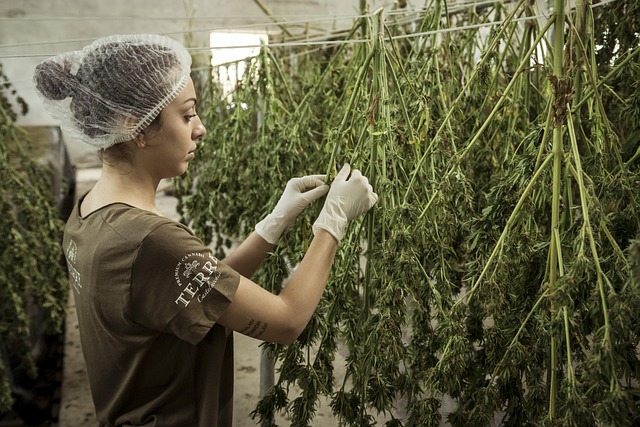Category: are thc gummies bad for dogs
Are THC Gummies Bad for Dogs? A Comprehensive Exploration
Introduction
In the rapidly evolving world of cannabis products, a growing trend has sparked both curiosity and concern: the use of THC gummies among dogs. This article delves into the complex topic of THC (tetrahydrocannabinol) gummies tailored for canine consumption, exploring their potential benefits and risks. We will navigate through various aspects, from understanding the substance to its global impact, economic implications, and future prospects. By the end, readers will gain a comprehensive insight into this controversial subject and be equipped to make informed decisions regarding their furry companions.
Understanding THC Gummies for Dogs: Unraveling the Basics
THC gummies specifically designed for dogs are edible cannabis-based treats infused with tetrahydrocannabinol (THC), commonly known as the psychoactive compound in marijuana. These gummies are marketed as a way to provide pets with potential therapeutic benefits, such as pain relief, anxiety reduction, and improved appetite. However, the notion of giving THC to dogs is not without controversy.
Core Components:
- THC: The primary active ingredient, THC, is responsible for the psychoactive effects associated with cannabis. In dogs, it interacts with their endocannabinoid system (ECS), which plays a role in regulating various physiological processes.
- Cannabis Infusion: Gummies are typically made by infusing cannabis extract into a soft, chewy base, often with added flavors and ingredients to enhance appeal.
- Purpose: Proponents suggest that THC gummies can help dogs manage pain, reduce anxiety, improve sleep, and stimulate appetite, especially in cases of cancer, arthritis, or other chronic conditions.
Historical Context:
The use of cannabis for medicinal purposes dates back centuries, with ancient cultures utilizing various parts of the plant for their therapeutic properties. Modern interest in canine cannabis began gaining traction around the late 2010s as pet owners sought alternative treatments for their pets’ ailments. This trend has led to a surge in research and product development, resulting in a diverse range of THC-infused treats available today.
Global Impact and Trends: A World-Wide Phenomenon
The global cannabis market, including THC gummies for dogs, is experiencing exponential growth, fueled by changing attitudes towards cannabis and its derivatives. According to a report by Grand View Research, the global cannabis market size was valued at USD 25.7 billion in 2021 and is expected to grow at a compound annual growth rate (CAGR) of 26.7% from 2022 to 2030. This trend extends beyond human consumption; pet products are emerging as a significant niche within the industry.
Regional Variations:
- North America: The United States and Canada have been at the forefront of legalizing cannabis, leading to a thriving market for canine cannabis products. Many companies in these regions specialize in creating high-quality THC gummies tailored for pets.
- Europe: Several European countries have liberalized their laws regarding cannabis, allowing for research and limited access to CBD (cannabidiol) and THC products for medical purposes. As a result, there is a growing presence of European brands offering canine cannabis treats.
- Asia: With varying legal landscapes, Asia presents a mix of opportunities and challenges. Some countries are embracing medicinal cannabis, while others maintain strict regulations, impacting the availability of THC gummies for dogs in the region.
Trends Shaping the Industry:
- Pet Wellness Focus: There is a growing emphasis on holistic pet care, encouraging owners to explore alternative treatments alongside traditional medicine.
- Personalized Medicine: The trend towards individualized healthcare extends to pets, with owners seeking personalized cannabis formulations for their dogs’ specific needs.
- E-commerce Rise: Online platforms have revolutionized the way consumers purchase THC gummies and other pet cannabis products, offering convenience and discreet access.
Economic Considerations: Market Dynamics and Implications
The economic landscape surrounding THC gummies for dogs is complex, with significant market potential and varying investment patterns across regions.
Market Dynamics:
- Product Diversity: The canine cannabis market offers a wide array of products, including gummies in various flavors, concentrations, and packaging formats to cater to diverse consumer preferences.
- Competitive Landscape: With increasing demand, the market is becoming increasingly competitive, with established pharmaceutical companies, specialized startups, and artisanal producers vying for market share.
- Price Points: Pricing strategies vary, from premium, high-concentration products to more affordable options, targeting different customer segments.
Investment Patterns:
- Venture Capital: The industry has attracted significant venture capital funding, with investors recognizing the potential for disruptive innovation and a rapidly growing market.
- Private Equity: Private equity firms are also investing in established cannabis companies that produce pet products, aiming to capitalize on the trend’s momentum.
- Regulatory Compliance: As regulations evolve, companies must navigate complex legal frameworks, impacting their operational costs and market expansion strategies.
Economic Impact:
- Job Creation: The burgeoning industry contributes to job creation across various sectors, from cultivation and manufacturing to sales and marketing.
- Tax Revenues: Legalized cannabis markets generate substantial tax revenues for governments, with potential implications for funding veterinary services and pet healthcare research.
- Consumer Spending: Growing consumer interest in canine cannabis products indicates increasing discretionary spending on pet wellness, reflecting a broader trend in the pet economy.
Technological Advancements: Enhancing the Landscape
Technological innovations play a pivotal role in shaping the future of THC gummies for dogs, improving product quality, safety, and accessibility.
Key Advancements:
- Cannabis Cultivation Techniques: Advanced growing methods, such as hydroponics and controlled environment agriculture, enable consistent production of high-quality cannabis, ensuring pure and potent ingredients for canine treats.
- Analytical Testing: Sophisticated analytical tools and methods ensure accurate THC content, purity, and safety, meeting regulatory standards and consumer expectations.
- Personalized Formulations: Technological advancements in drug delivery systems and formulation techniques allow for the creation of customized THC gummies tailored to individual dogs’ needs, optimizing therapeutic effects and minimizing side effects.
- Online Platforms: E-commerce platforms facilitate direct-to-consumer sales, providing a convenient and accessible way for pet owners to purchase THC gummies, especially in regions with limited physical access.
Future Potential:
- Nanotechnology: Researchers are exploring the use of nanotechnology to deliver cannabis compounds more effectively, potentially enhancing the bioavailability of THC and other cannabinoids in gummy formulations.
- Genetic Engineering: Developing cannabis strains with specific traits, such as high CBD content or reduced psychoactive effects, could offer safer and more targeted options for dogs.
- Digital Health Solutions: Integrating digital health platforms with THC gummy products can provide pet owners with personalized recommendations, tracking tools, and access to veterinary professionals, enhancing overall pet care.
Policy and Regulation: Navigating Legal Waters
The regulatory landscape surrounding THC gummies for dogs is complex and varies significantly across jurisdictions, impacting product availability, quality, and consumer protection.
Key Regulatory Considerations:
- Legal Status of Cannabis: The legal status of cannabis (and by extension, THC) varies widely globally. Some countries have legalized it for both medicinal and recreational purposes, while others allow only limited access for medical use.
- Veterinary Regulations: In regions where canine cannabis products are legal, veterinary regulations often dictate the production, sale, and administration of these treats to ensure animal safety and welfare.
- Product Labeling and Packaging: Strict labeling requirements mandate clear information on ingredient lists, THC content, dosage instructions, and potential side effects to educate consumers and prevent misuse.
Regulatory Frameworks:
- United States: The United States has a fragmented regulatory landscape due to varying state laws. Some states allow THC gummies for dogs with specific conditions, while others have stricter regulations or outright prohibitions. The U.S. Food and Drug Administration (FDA) provides guidelines but does not approve cannabis products for animals.
- Canada: Canada legalized recreational cannabis in 2018, leading to a growing market for pet products. Health Canada regulates cannabis products, including those intended for pets, with strict quality control measures.
- European Union: The EU has harmonized regulations across member states, allowing for the legal sale of CBD and THC products for specific medical conditions. Individual countries have varying requirements for product registration and labeling.
Challenges and Opportunities:
- Harmonization: Achieving consistent regulations globally is challenging but essential to ensure consumer safety and prevent the exploitation of pet owners.
- Research Gaps: The lack of extensive research on the long-term effects of THC in dogs presents a significant challenge, underscoring the need for more studies to inform effective regulation.
- Market Expansion: Legalization and regulatory clarity open up opportunities for companies to expand their operations, catering to the growing global demand for canine cannabis products.
Challenges and Criticisms: Addressing Concerns
THC gummies for dogs are not without criticism and potential safety concerns. Addressing these challenges is crucial for fostering public trust and ensuring responsible product development.
Main Challenges:
- Limited Scientific Research: The relatively recent emergence of this field means there is a dearth of extensive scientific studies on the long-term effects of THC in dogs, raising questions about potential risks.
- Dosage and Administration: Determining appropriate dosages for dogs is challenging due to individual variations in metabolism and body composition, leading to potential overdose risks.
- Counterfeit and Contaminated Products: The lack of regulation in some regions can result in counterfeit or contaminated products, posing health risks to pets and pet owners.
- Public Perception: Negative stereotypes associated with cannabis use can deter pet owners from exploring these options, despite potential benefits.
Proposed Solutions:
- Research Funding: Encouraging investment in research by governments and private institutions is vital to address knowledge gaps and gain a deeper understanding of THC’s effects on canine physiology.
- Standardized Dosage Forms: Developing standardized dosage forms and packaging, similar to pharmaceutical products, can ensure accurate administration and reduce the risk of overdose.
- Rigorous Quality Control: Implementing stringent quality control measures during production and distribution can help combat counterfeit products and ensure consumer safety.
- Public Awareness Campaigns: Educative campaigns can dispel myths, provide accurate information, and encourage responsible use of THC gummies for dogs.
Case Studies: Real-World Applications and Lessons Learned
Incorporating real-world examples offers valuable insights into the successful application of THC gummies for dogs and the challenges encountered.
Case Study 1: Chronic Pain Management in Senior Dogs
A study conducted at the University of California, Davis, focused on using THC gummies to manage chronic pain in senior dogs. Over a period of six months, researchers administered customized THC gummy doses to a group of older canines with osteoarthritis. The results showed significant reductions in pain-related behavior and improved mobility, leading to better quality of life for the participating dogs. This study highlights the potential of THC gummies in managing chronic conditions, but it also emphasizes the need for personalized dosing and veterinary supervision.
Case Study 2: Anemias Treatment in Cancer Patients
A small-scale trial in Canada explored the use of THC gummies to stimulate appetite and improve nutrition in dogs with cancer-related anemias. The results indicated increased food intake and improved overall condition in the treated dogs, suggesting THC’s potential role in managing nutritional deficiencies associated with cancer. This case underscores the importance of combining traditional treatments with alternative approaches for holistic patient care.
Lessons Learned:
- Personalization is Key: Both studies emphasize the importance of tailoring THC gummy dosages to individual dog needs, considering factors like age, weight, and underlying health conditions.
- Veterinary Supervision: Consistent veterinary monitoring is essential to ensure safe and effective treatment, especially when introducing new substances into a pet’s regimen.
- Long-Term Research: While these case studies provide valuable insights, further long-term research is necessary to fully understand the benefits and risks associated with THC gummies for dogs.
Future Prospects: Looking Ahead
The future of THC gummies for dogs holds immense potential, with emerging trends and strategic considerations shaping this evolving industry.
Potential Growth Areas:
- Personalized Medicine: The trend towards individualized pet healthcare will likely continue, leading to a greater emphasis on customized THC gummy formulations tailored to specific canine needs.
- Holistic Care Integrations: As holistic veterinary medicine gains popularity, THC gummies may become an integral part of comprehensive treatment plans for various conditions.
- Global Market Expansion: With increasing legalization and regulatory clarity, the global market is poised for significant growth, offering opportunities for international companies to enter this space.
Emerging Trends:
- Telemedicine Integration: Online veterinary consultations could make THC gummy prescriptions more accessible, especially in rural or underserved areas.
- Cannabis Strain Diversification: Exploring cannabis strains with diverse cannabinoid profiles may unlock new therapeutic potential for canine applications.
- Digital Health Solutions: The integration of artificial intelligence and machine learning algorithms could enhance personalized dosing and treatment recommendations for THC gummies.
Strategic Considerations:
- Research and Development: Investing in R&D is crucial to advancing product quality, safety, and efficacy, ensuring a robust pipeline of innovative THC gummy products.
- Regulatory Engagement: Collaborating with regulatory bodies can help industry stakeholders shape effective policies, facilitating market growth while maintaining consumer protection.
- Consumer Education: Proactive public education initiatives can dispel myths, promote responsible use, and foster a positive perception of THC gummies for dogs.
FAQ: Addressing Common Concerns
Q: Are THC gummies bad for all dogs?
A: No, not all dogs will be negatively affected by THC gummies when used responsibly and under veterinary supervision. However, individual responses can vary, and certain breeds or dogs with specific health conditions may be more sensitive to THC.
Q: What are the potential side effects of THC gummies for dogs?
A: Side effects can include mild lethargy, increased appetite, dry mouth, red eyes, and altered behavior. In some cases, severe reactions like seizures or panic attacks have been reported but are considered rare. Close monitoring is essential when introducing THC products to a dog’s regimen.
Q: How do I know if my dog needs THC gummies?
A: Consult with your veterinarian if you suspect your dog may benefit from THC gummies. They can evaluate your pet’s health, discuss potential risks and benefits, and provide guidance on appropriate dosages and product selection.
Q: Are there any legal restrictions on using THC gummies for my dog?
A: Legalities vary widely. Some countries and regions allow THC gummies with specific conditions, while others have stricter prohibitions. Always check local laws and regulations before considering THC products for your pet.
Q: How can I ensure the quality and safety of THC gummies for my dog?
A: Look for reputable brands that adhere to strict quality control measures during production. Choose products with clear labeling, including ingredient lists, THC content, and dosage instructions. Purchase from licensed retailers or online platforms known for their integrity.
As the conversation around cannabis in veterinary medicine continues to evolve, THC gummies for dogs offer both promising potential and significant challenges. Responsible product development, robust research, and effective regulation are essential to harnessing the benefits while ensuring pet safety. With ongoing advancements, these gummy treats may become a valuable tool in holistic canine care.
Hemp Oil: Natural Relief for Your Dog’s Pain, No THC Gimmicks!
Hemp Fiber: Natural Relief for Dogs, No THC Gummie Worries!
Experience THC Relief Without Risking Your Pet’s Health: Free Shipping!

Tired of the worry and potential harm associated with THC gummies, especially their detrimental effe…….
Revolutionize Dog Wellness: Pure Hemp Capsules, No THC Gummy Risks!
Revolutionize Dog Care: New, Safe THC Inhalers – No More ‘Are THC Gummies Bad for Dogs’ Worries!
THCA Vaporizer Oil: All-Natural, Harmful Gummies-Free Relief for Dogs

Tired of worrying about the potential harm caused by THC gummies for your furry friend? Introducing…….
All-Natural THCA Lotion: Safe Pain Relief, No High—Say Goodbye to Dog Anxiety!

Tired of worrying about those pesky side effects and whether THC gummies are bad for dogs? Our THCA…….






